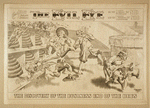"The Creole sauntered across to the counter and nipped the herb which still lay there.
'Mr. Frowenfeld, you know what some very excellent people do with this?
They rub it on the sill of the door to make the money come into the house.'
Joseph stopped aghast with the drawer half drawn.
'Not persons of intelligence and-----'
'All kinds. It is only some of the foolishness which they take from the slaves. Many of your best people consult the voudou horses.' "
This quote is taken from George Washington Cable's The Grandisssimes (1880) a novel set in New Orleans at the time of the Louisiana Purchase. In this scene, Agricola Fusilier instructs the newest apothecary, the northern born Joseph Frowenfeld, in the local practice of voudou. The herb in question is basil or basilic and it has been requested of Frowenfeld by the major female character of the novel, Aurore Nancanou, who does not have enough money to make rent. Frowenfeld, who is the naif for most of this novel, is surprised by the citizenry's superstitious beliefs.
For Cable, superstition is but one outer manifestations of a society that is weak and rotten--economically, politically, and racially. Seemingly exotic--much like the landscape, flora and fauna---Creole superstitions are nevertheless part of a system of beliefs that is irrational and that relocates agency in spirits rather than in human effort or worthiness. I've written about the power of herbs before. And while this is not the most significant passage in Cable's novel, it is interesting to think about the strong hold that superstition has on the imagination--even in contemporary times. The idea that charms can safeguard us, or that supernatural beings can work to our advantage is a persistent one. If Cable's assessment is historically specific in some ways, it also underscores something about human fears about the essential insecurity of life and the way we look to the material world for reassurance of our good fortune.
Subscribe to:
Post Comments (Atom)






No comments:
Post a Comment